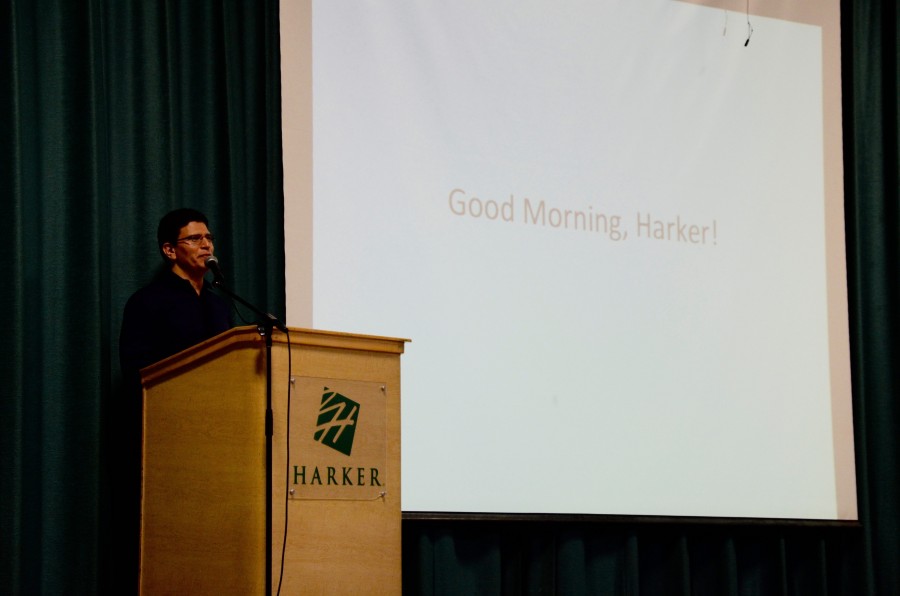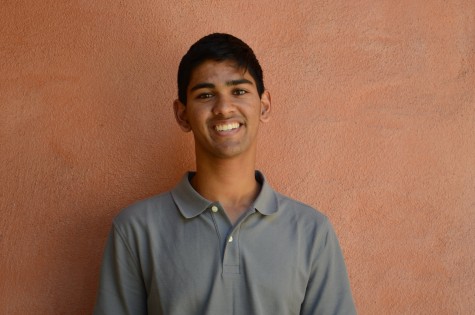GSA invites guest speakers to raise support for the LGBTQ community
GSA advisor Abel Olivas addresses the student body before the speakers take the stage. Olivas has been the GSA club advisor since the club’s creation.
November 11, 2015
The Gender Sexuality Alliance (GSA) club held its biannual assembly about sexuality awareness today morning in the gym in which two guest speakers addressed students about the lesbian, gay, bisexual, transgender and queer (LGBTQ) population and the ways in which the community can best facilitate the “coming out” process.
The 55-minute talk covered the Obergefell v. Hodges Supreme Court case decision from June which declared same-sex marriage constitutional. The speakers also discussed the LGBTQ counseling services available in the Bay Area and recent outreach efforts to increase sexuality awareness and the ways that allies, individuals who do not identify as LGBTQ but who accept the LGBTQ community, can better express their support.
The assembly featured guest speakers Ruth McFarlane, the Director of Programs at the San Francisco LGBT Center, and Anthony Ross, the Outlet Program Director at Outlet Adolescent Counseling Services in Palo Alto. Both speakers discussed the difficulties of “coming out” and recognizing one’s sexuality and identity. To Ross, youths typically find “coming out” to their families most stressful.
“There’s several different things that youths often come [to] grips with,” Ross said. “Often kids will come in as questioning, and then they’ll understand ‘Oh, this is who I really am’ and then the second thing is coming out to family and coming out to parents. And third is coming out at school. Coming out to family is the hardest. Friends are usually the first to know.”
Ross and McFarlane also claimed that allies also have important roles in the “coming out” process because they indirectly help the LGBTQ individuals reveal their sexual identities by advocating for overarching equality. McFarlane emphasized this message of alliance and support by quoting Tim Wise, a civil rights activist who believed “allies reveal the secrets of privilege.”
McFarlane also believes that popular media and LGBTQ celebrities have made “coming out” easier for most of the community.
“We were talking before about how important technology in general has been — access to information has been absolutely huge,” McFarlane said. “Ellen DeGeneres came out on television, and that was, for lesbians, a huge, huge, thing that that was possible. So what’s in the media, Caitlin Jenner and some of these other stars, their being there and being visible makes it possible for people to have conversations that they might not have had.”
Ross and McFarlane continued to clarify that, though many such celebrities have had strong positive effects on the public perception of the LGBTQ community, their experiences cannot generalize to the conditions faced by most other LGBTQ individuals, who may not have the same resources and, thus, find it more difficult to “come out.”
The GSA club, formerly known as the Gay-Straight Alliance club, invited the guest speakers to campus. The club aims to open conversations regarding LGBTQ rights and concerning equality among genders and sexual orientations.
To Abel Olivas, who teaches Spanish and has been GSA’s adviser since the club’s conception 17 years ago, time has made it easier for students at campus to “come out.”
“We [are getting] more LGBT kids joining the club,” Olivas said. “For a long time, it was just straight allies. Finally, I forgot which year it was, the first gay kid comes to the GSA. Then it got to a point that kids were starting to come out and starting to come to the GSA as self-identified LGBT kids. And this year we kind of have the spectrum of LGBT — everybody’s represented.”
Like Ross and McFarlane, Olivas credits much of the recent improvements to the media and the internet, which have “[opened] up a whole world for [students] that’s very helpful” for adjusting the culture around the LGBTQ community.
Those not directly involved with GSA activities also found the assembly useful. According to Srivatsav Pyda (11), the sexuality awareness awareness discussion mirrored the Lincoln-Douglas debate team’s previous debate topic..
“Our last debate topic was about autonomous adolescent choices,” Srivatsav said. “The affirmative [argument] that I personally [was] reading allowed transgender adolescents to seek cross-sex hormones without the permission of their parents, especially in cases of their parents not being as open to their [kids] being transgender or being queer in any way. I think society in general is moving to become more critical of oppressive structures in society and it’s causing us to question our own privilege.”
The GSA club meets Wednesdays at noon. Following this assembly, it plans to post additional information on its club bulletin board to continue raising funds for and awareness of LGBTQ outreach around the Bay.


















![“[Building nerf blasters] became this outlet of creativity for me that hasn't been matched by anything else. The process [of] making a build complete to your desire is such a painstakingly difficult process, but I've had to learn from [the skills needed from] soldering to proper painting. There's so many different options for everything, if you think about it, it exists. The best part is [that] if it doesn't exist, you can build it yourself," Ishaan Parate said.](https://harkeraquila.com/wp-content/uploads/2022/08/DSC_8149-900x604.jpg)




![“When I came into high school, I was ready to be a follower. But DECA was a game changer for me. It helped me overcome my fear of public speaking, and it's played such a major role in who I've become today. To be able to successfully lead a chapter of 150 students, an officer team and be one of the upperclassmen I once really admired is something I'm [really] proud of,” Anvitha Tummala ('21) said.](https://harkeraquila.com/wp-content/uploads/2021/07/Screen-Shot-2021-07-25-at-9.50.05-AM-900x594.png)







![“I think getting up in the morning and having a sense of purpose [is exciting]. I think without a certain amount of drive, life is kind of obsolete and mundane, and I think having that every single day is what makes each day unique and kind of makes life exciting,” Neymika Jain (12) said.](https://harkeraquila.com/wp-content/uploads/2017/06/Screen-Shot-2017-06-03-at-4.54.16-PM.png)








![“My slogan is ‘slow feet, don’t eat, and I’m hungry.’ You need to run fast to get where you are–you aren't going to get those championships if you aren't fast,” Angel Cervantes (12) said. “I want to do well in school on my tests and in track and win championships for my team. I live by that, [and] I can do that anywhere: in the classroom or on the field.”](https://harkeraquila.com/wp-content/uploads/2018/06/DSC5146-900x601.jpg)
![“[Volleyball has] taught me how to fall correctly, and another thing it taught is that you don’t have to be the best at something to be good at it. If you just hit the ball in a smart way, then it still scores points and you’re good at it. You could be a background player and still make a much bigger impact on the team than you would think,” Anya Gert (’20) said.](https://harkeraquila.com/wp-content/uploads/2020/06/AnnaGert_JinTuan_HoHPhotoEdited-600x900.jpeg)

![“I'm not nearly there yet, but [my confidence has] definitely been getting better since I was pretty shy and timid coming into Harker my freshman year. I know that there's a lot of people that are really confident in what they do, and I really admire them. Everyone's so driven and that has really pushed me to kind of try to find my own place in high school and be more confident,” Alyssa Huang (’20) said.](https://harkeraquila.com/wp-content/uploads/2020/06/AlyssaHuang_EmilyChen_HoHPhoto-900x749.jpeg)







